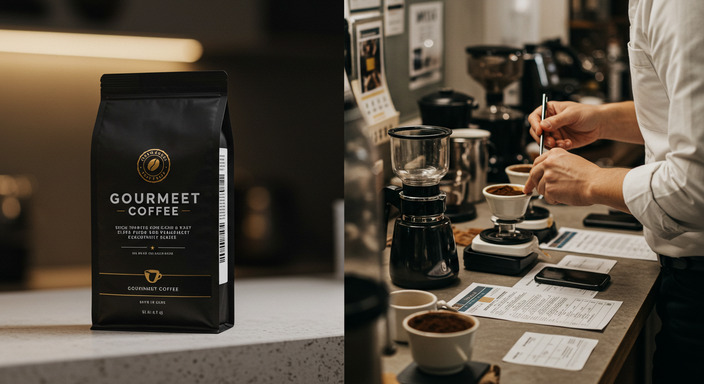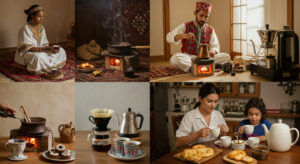What score does coffee need to be “specialty”?
Introduction: The Allure of Specialty Coffee
Have you ever wondered what sets specialty coffee apart from the regular cup of joe? With an average of more than 2.25 billion cups of coffee consumed each day worldwide, the quest for the perfect brew is more prevalent than ever. This surge in coffee consumption has spawned an entire industry focused on specialty coffee, an epitome of quality that promises an exceptional experience for consumers. The designation of “specialty” is not just a marketing term but a precise classification that this article will explore, from the details of scoring to the nuances that define exceptional quality.
Specialty coffee is distinguished by its quality in every step of production, from the bean to the cup. The journey to achieve such status involves meticulous grading and scoring processes. This article will guide you through the intricate systems and criteria applied to ascertain what qualifies a coffee as specialty, and how these standards impact coffee enthusiasts and industries alike.
The Scoring Process: Understanding Coffee Quality
The scoring system for coffee is vital to understanding what earns the specialty label. The Specialty Coffee Association (SCA) is the authoritative body that standardizes these scores, ensuring consistency and reliability worldwide. Coffees are graded on a scale of 100 points based on various attributes that influence the overall taste. But how does this scoring system work, and which criteria are deemed most crucial?
Quality assessments in coffee revolve around several parameters, notably aroma, flavor, aftertaste, acidity, body, balance, sweetness, cleanliness, uniformity, and overall cup experience. Each category contributes to the overall score, with different weightings assigned based on their impact on the consumer’s sensory experience.
| Attribute | Description | Score Range |
|---|---|---|
| Aroma | The sensory smell experience of the coffee | 0-10 |
| Flavor | The overall taste of the coffee in the mouth | 0-10 |
| Aftertaste | The lingering tastes left after swallowing | 0-10 |
| Acidity | The lively, bright taste profile of the coffee | 0-10 |
| Body | The weight and texture perceived in the mouth | 0-10 |
| Balance | The harmony and interplay of each attribute | 0-10 |
To be classified as a specialty coffee, the brew must achieve a score of 80 points or higher. Coffees that fall below this threshold are considered of standard quality and do not receive the specialty designation. This meticulous scoring system ensures only the highest-quality brews receive this esteemed acknowledgment.
The Role of the Q Grader
A crucial player in the journey of specialty coffee is the Q Grader. Trained and certified by the Coffee Quality Institute, Q Graders possess the acute sensory skills required to accurately assess and score coffee. Their evaluations are integral to determining whether a coffee meets the standards of specialty quality.
“Coffee is a beverage that puts one to sleep when not drank.” – Alphonse Allais
Q Graders undergo rigorous training, involving sensory skills tests and practical exams, to achieve a certification that is recognized globally. They act as quality arbiters, ensuring that coffee producers adhere to quality standards and that consumers receive the premium product promised by the specialty coffee label.
Through their expertise, Q Graders offer an assurance of quality, bolstering confidence in the specialty coffee market—a market increasingly saturated with options yet distinguished by its commitment to excellence.
The Impact of Bean Origin and Processing
Origin and processing play a significant role in determining the score and specialty status of coffee. The geographical location where coffee is grown affects the flavor profile immensely. Factors such as elevation, climate, and soil quality contribute to the distinct characteristics we find in coffee beans from different regions.
For instance, Ethiopian coffees are renowned for their fruity notes, while Brazilian coffees often possess nutty flavors. Additionally, the methods employed during processing—whether washed, natural, or pulped natural—can enhance or subdue certain flavor elements, thus impacting the final score. These variables are crucial in the assessment and conformation of a coffee’s specialty status.
Environmental and Economic Impacts of Specialty Coffee
The production of specialty coffee incurs both environmental and economic implications worthy of investigation. Specialty coffee, with its emphasis on quality, often requires pesticide-free cultivation and careful soil management to maintain the integrity of flavor and authenticity of the bean. This fosters sustainable agricultural practices that can protect ecosystems but often involves higher production costs.
From an economic perspective, specialty coffee commands higher market prices, yielding better profits for farmers who meet its rigorous standards. This, in turn, incentivizes investment in quality cultivation that benefits both producers and consumers. However, on the flip side, the agricultural practices needed to achieve specialty status can lead to higher operational expenses, making it a demanding endeavor for small-scale farmers.
FAQ – Common Questions
What is the minimum score required for coffee to be labeled “specialty”?
Coffee must score at least 80 points out of 100 in the SCA’s evaluation to earn the “specialty” label.
Who determines the specialty status of a coffee?
Certified Q Graders, trained by the Coffee Quality Institute, assess and score the coffee to determine its specialty status.
Why does the origin of coffee matter in its quality assessment?
The origin impacts flavor profile attributes such as acidity and body due to differing climates, soils, and altitudes.
How does processing affect coffee quality?
Processing methods like washing or natural drying influence taste and aroma, playing a role in the coffee’s final score.
What benefits do farmers gain from producing specialty coffee?
Higher market prices and potential profitability due to the premium quality and sustainability focus of specialty coffee.
Conclusion
The journey to achieving the status of specialty coffee is marked by stringent requirements and a meticulous scoring system aimed at ensuring the highest quality experience for consumers. From detailed assessments by certified Q Graders to considerations of origin and processing techniques, every factor intertwines to shape what we ascertain as specialty coffee. As such, this pursuit not only elevates our morning ritual of sipping coffee but also supports sustainable practices and offers economic benefits to the regions and farmers engaged in this exceptional cultivation.
Meta Descrição: Discover what qualifies coffee as “specialty” through scoring systems, Q Graders, and factors like origin and processing, in this detailed exploration.














Post Comment